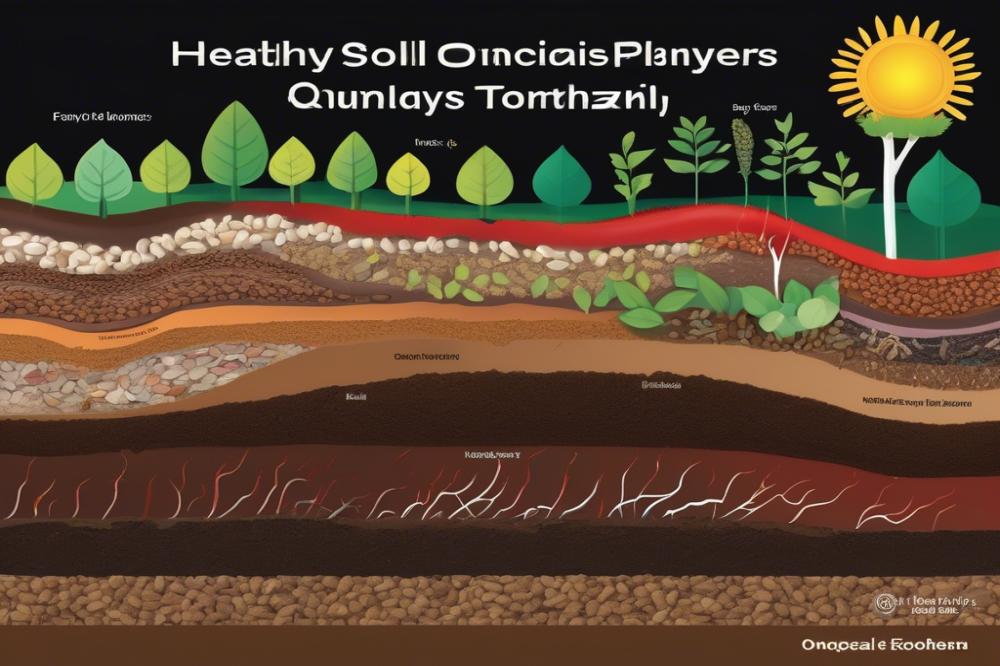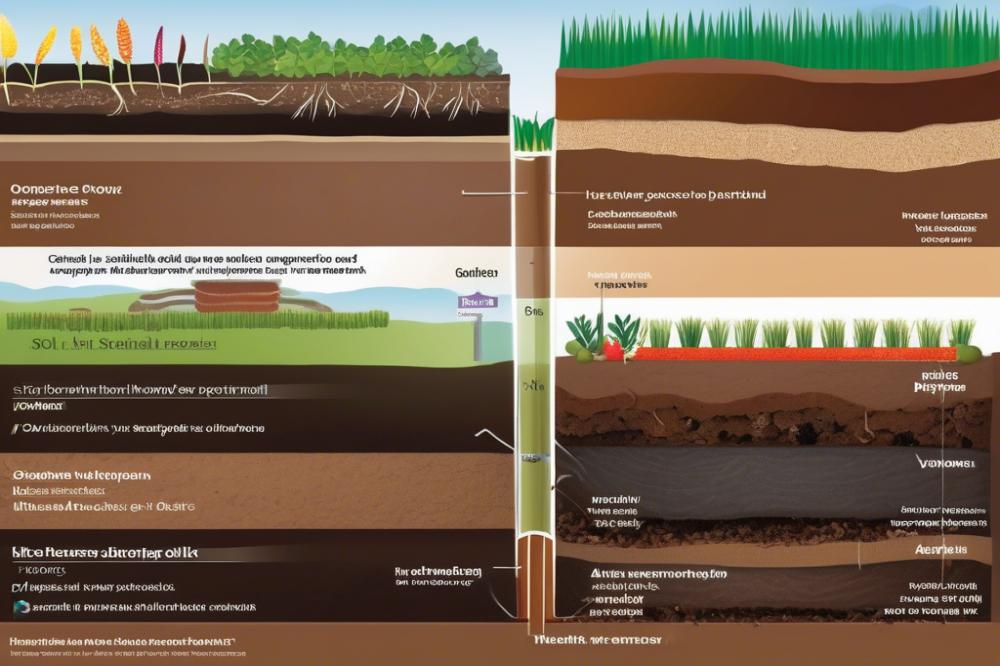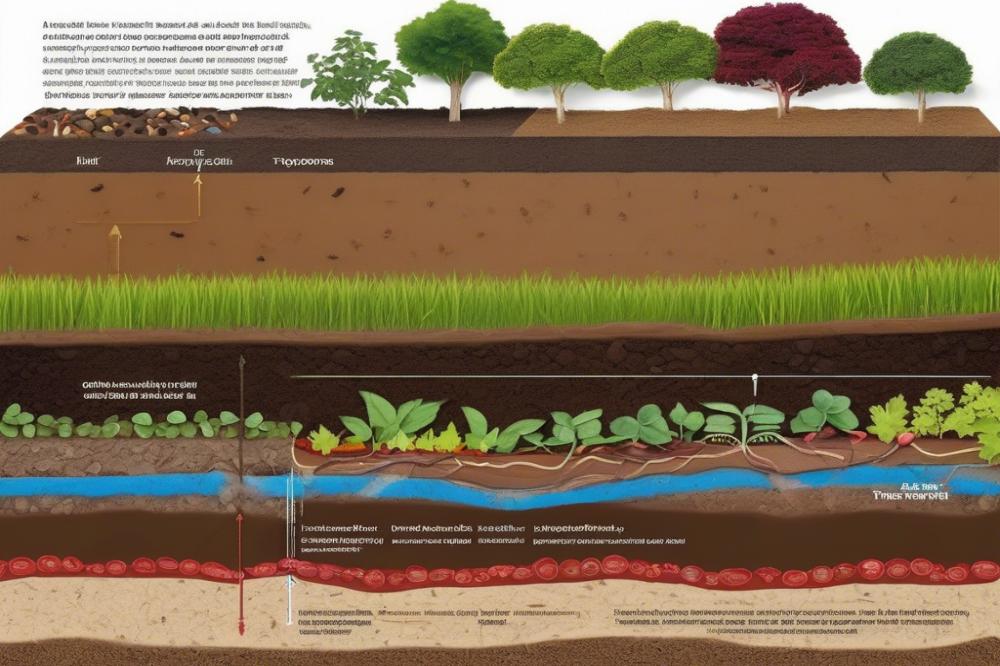The Importance of healthy soil in natural pest control
healthy soil is more than just dirt; it is a complex ecosystem teeming with life. It provides essential nutrients for plants and supports a diverse community of organisms. This ecosystem plays a critical role in how plants grow and thrive. Without a strong foundation of soil health, gardens can struggle in various ways, especially when it comes to pests.
natural pest control is an approach that relies on natural predators to manage pest populations. In gardens, this means using techniques that promote the presence of beneficial insects and other organisms. An ecological balance fosters resilience in plants, allowing them to ward off pests more effectively. Healthy soil directly contributes to this balance by providing the right environment for beneficial organisms.
Connecting soil health with pest management is key in sustainable agriculture. When soil is rich in biodiversity, it encourages a range of organisms that help control pests. These valuable soil organisms, such as earthworms and certain bacteria, enhance plant health. Healthy plants are more resilient and can often resist pest threats without the need for chemical interventions.
Composting is one method to improve soil quality and promote diversity. By adding organic matter, gardens can nurture beneficial organisms that help manage pests naturally. The emphasis on soil health in organic farming highlights how critical it is in creating a thriving garden environment. In turn, this leads to fewer pest problems and reduces the need for harmful pesticides.
Ultimately, understanding the connection between soil and pests empowers gardeners to create healthier landscapes. A thriving ecosystem in the ground supports plants that can resist and outcompete many pests. Therefore, focusing on soil health is not just an agricultural practice; it is a vital strategy for effective natural pest control.
The Role of Healthy Soil in Pest Management


Soil health directly influences plant health. Strong plants can better resist pests and diseases. A nutrient-rich environment fosters robust growth, providing crops with the strength they need to thrive. Essential nutrients play a vital role in enhancing crop resilience against harmful insects.
Soil organisms, such as earthworms and beneficial microbes, contribute significantly to this process. They break down organic matter, enriching the soil and allowing plants to access vital nutrients. Composting not only returns nutrients to the earth but also promotes a diverse community of organisms.
The relationship between healthy soil and plant vigor is often overlooked. When soil is healthy, it supports biodiversity above and below the surface. This variety creates a balanced ecosystem, which is crucial for effective pest management strategies. Pests tend to be less of a problem in farms that embrace sustainable agriculture and organic farming practices.
Farmers who prioritize soil health may notice fewer pest outbreaks. A diverse ecosystem means pest predators, like ladybugs and lacewings, can thrive. This natural predation helps control pest populations without the need for chemical interventions.
Using a variety of plants can also enhance ecological balance. Different crops attract various beneficial organisms, leading to a healthier farm environment. By managing soil health, growers can create a self-sustaining system where natural defenses are always ready to fend off pests.
Soil Organisms: Allies in Pest Control


A rich array of organisms thrive in the soil. This biodiversity plays a vital role in maintaining soil health. Healthy ecosystems help support plant health by providing necessary nutrients. Various creatures, from bacteria to larger organisms, actively participate in pest management. They create an ecological balance that benefits crops and farmers alike.
Beneficial soil organisms are often overlooked. These tiny helpers break down organic matter, recycling nutrients into the soil. Composing rich materials enhances the fertility of the land. They also bolster crop resilience against pests by promoting strong plant growth. This, in turn, leads to healthier yields over time.
Numerous examples of soil organisms showcase their importance. Earthworms aerate the soil, improving water flow and nutrient uptake. Nematodes can target harmful pests in the soil, helping to reduce crop damage. Certain bacteria and fungi form symbiotic relationships with plants. These partnerships improve nutrient absorption and create a strong defense against pests. This interaction highlights the interconnectedness of life within the soil.
Organic farming leverages these natural allies. By practicing sustainable agriculture, farmers can maintain healthy ecosystems. Practices like composting enrich the soil with valuable nutrients and beneficial organisms. This not only enhances biodiversity but also fosters an environment where pests struggle to thrive. In such an ecosystem, pests do not dominate, allowing crops to flourish.
Organic Farming Practices for Soil Health


Organic farming is centered around principles that prioritize natural processes and ecological balance. These methods focus on avoiding synthetic chemicals and promoting biodiversity. Farmers aim to cultivate practices that encourage a thriving ecosystem in the soil. This leads not only to healthier crops but also to a more resilient agricultural environment.
Techniques for Improving Soil Health
Several techniques exist for enhancing soil health. Crop rotation is one such method. By alternating different crops, farmers can prevent soil depletion and reduce pest populations. Cover crops are useful as well. They protect the soil from erosion and improve fertility when tilled into the ground.
Another valuable practice is the use of organic mulches. They provide protection for soil organisms, improve moisture retention, and suppress weed growth. Soil testing is an important step too. It helps in understanding nutrient levels and indicates which amendments are necessary. With this knowledge, farmers can make informed decisions to boost crop health.
Composting as a Method to Enrich Soil and Enhance Pest Resistance
Composting serves as a cornerstone of organic practices. It transforms organic waste into rich nutrients for the soil. As compost breaks down, it introduces various beneficial microorganisms. These soil organisms contribute to plant health and overall agricultural resilience.
Using compost not only enriches the soil but also enhances pest management. A balanced compost can help strengthen plants, making them more resistant to pests and diseases. Healthy plants are naturally better at fending off harmful insects. Furthermore, composting fosters biodiversity. This diversity plays a crucial role in establishing an ecological balance within any farming system.
Sustainable Agriculture and Its Impact on Soil Health


Definition of Sustainable Agriculture
Sustainable agriculture refers to farming practices that focus on environmental health, economic profitability, and social equity. This approach considers the long-term impact of farming methods on our planet. Farmers aim to create an ecological balance that promotes biodiversity. By using techniques that align with nature, they work to protect soil health and support the surrounding ecosystem.
Long-term Benefits of Sustainable Practices on Soil and Pest Management
Implementing sustainable practices can lead to a variety of long-term benefits. Healthy soils improve plant health, allowing crops to thrive. Such practices boost crop resilience against pests and diseases. Instead of relying on synthetic chemicals, farmers cultivate natural solutions. Rotating crops and using cover crops can enhance soil structure and nutrients. These methods encourage soil organisms, which help control pests naturally. Over time, this leads to a more balanced farm environment.
Case Studies of Successful Sustainable Farming Methods
Many farmers around the world have successfully adopted sustainable agriculture. In California, one farm focused on organic farming, creating a rich habitat for beneficial insects. This method reduced the need for pesticides, showcasing how diverse ecosystems promote pest management. In another case, a community in Brazil used composting to improve soil fertility. Their efforts led to abundant harvests, demonstrating the power of organic inputs. These examples illustrate how sustainable methods not only protect the environment but also enhance food production.
Challenges to Maintaining Healthy Soil
Many factors threaten soil health in today’s world. Pesticides are commonly used to control pests but can have negative effects on soil organisms. These chemicals kill not only harmful insects but also beneficial microbes, disrupting the balance that plants need to thrive. Monoculture, the practice of growing the same crop year after year, depletes essential nutrients and decreases biodiversity. Less diversity means weaker ecosystems, which can lead to more pest problems over time.
It is vital to address these challenges for effective pest management. Healthy soil supports diverse plant life and helps create a natural resistance to pests. Without proper care, the soil’s ability to support crops diminishes, risking food security. When plants are healthier, they can resist pests better. This resilience is key in sustainable agriculture, where the goal is to farm while maintaining ecological balance.
Several strategies can help overcome these soil health challenges. Organic farming focuses on natural methods to manage soil health, enhancing biodiversity. Crop rotation is another effective method. Changing crops each season helps prevent disease buildup in the soil. Composting is a simple and effective way to enrich soil without using chemicals. Compost adds valuable nutrients and improves the soil structure, benefiting plant health. Using these methods can lead to improved crop resilience against pests.
Maintaining soil health shares a direct link to effective pest management strategies. Soil organisms thrive in a balanced ecosystem and play a crucial role in breaking down organic matter. Their activities help supply plants with necessary nutrients. By prioritizing these practices, farmers can create a thriving agricultural system. There is a lot at stake, and everyone benefits when soil is treated well.
Final Thoughts on Soil’s Role in Pest Management
It’s clear that successful pest control relies heavily on the foundation of soil health. By nurturing the ground where plants grow, gardeners foster an environment that encourages natural pest predators. Healthy ecosystems are rich in biodiversity, which creates a balance that keeps harmful pests at bay. Strong, vibrant soil teems with life, from beneficial microbes to earthworms. Each plays a part in creating a resilient garden.
Many gardeners might feel overwhelmed by pest issues. However, the solution often lies beneath our feet. Focusing on soil quality can lead to fewer pest problems without relying on harmful chemicals. Simple practices like composting, crop rotation, and cover cropping can significantly enhance the soil. This, in turn, supports plants in resisting pests naturally.
Now is the perfect time for gardeners to embrace these methods. A conscious effort to improve soil can change the way we approach gardening. Instead of treating symptoms, we can address the root causes of pest outbreaks. The benefits will be far-reaching, not just for individual gardens but for the environment as well.
Looking ahead, imagine a gardening world that prioritizes sustainable practices. Gardening can evolve into a practice that relies less on chemical interventions and more on natural solutions. Picture communities coming together to share knowledge on soil management techniques. This vision can be our reality if we commit to nurturing the ground we grow in. Embrace the journey of improving your soil health and watch as nature finds its balance.



